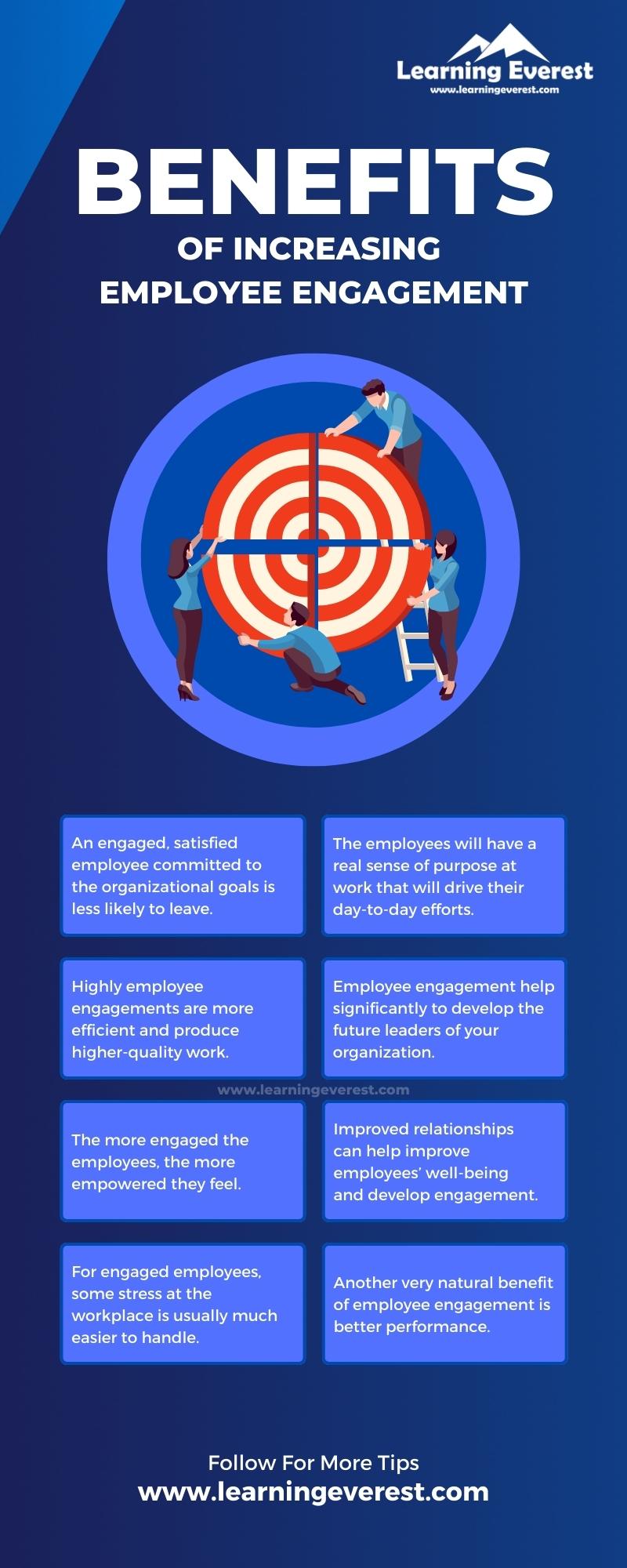From better employee retention to improved employee performance and even developing future leaders, building employee engagement is a critical element of any organization’s training needs for the future of the organization.
Table of Contents
Here are just a few benefits of employee engagement in detail
1. Retain employees
The better employees feel in their role and position, the less likely they will jump to another company or, worse, your direct competitor. One of the significant benefits of employee engagement is that it helps to build loyalty towards an organization as there is an investment in the individual which can help further their careers. An engaged, satisfied employee committed to the organizational goals is less likely to leave. It also helps to build and expand understanding and refine skills, which can help a business’s employee value proposition. It becomes way more effortless in the recruitment process as well.
2. Drive Motivation
When employees understand and feel recognized, they have the opportunity to not only create their own abilities and skills through work and training, but it can provide a motivation boost as they’ll likely be more engaged with their roles and willing to work more to not only to build their careers but your organization’s too. By understanding how their jobs contribute to your business, your employees will have a real sense of purpose at work that will drive their day-to-day efforts.
3. Increased productivity
Highly employee engagements are more efficient and produce higher-quality work. Because they are personally invested in their job roles, and their performance matters to them. They are aligned with the team members and business goals and accountable for their contribution. This means increased employee productivity and greater returns for your business.
4. Develop future leaders
Having training that is specified in this area is going to help significantly and develop the future leaders of your organization moving forwards. What is important to remember is that organizations need to forecast their anticipated staffing and skills needs and aim to fulfill these through training and development. What is lacking? What is going to help develop your future workforce and leadership? What changes can be anticipated and managed in the structure of your organization? These are essential questions before implementing specific training in this area.
5. Empower employees
The more engaged the employees, the more empowered they feel. There is a greater sense of having the inspiration to succeed and grow into not only the role but the organization’s future. Employees who feel empowered within the workplace will be more influential to other employees and gain their trust. Developing a greater sense of autonomy, value, and confidence within their work is a by-product of this development. Moreover, employee engagement does not just benefit individual employees – it benefits the entire team. This is because engaged employees perform better. When a group of engaged employees works together, they naturally perform at their best. Therefore, individual engagement improves team engagement, and individual performance leads to team performance.
6. Develop workplace relationships
Workplace relationships and communications can be enhanced through training and development opportunities. These improved relationships can help improve employees’ well-being and develop engagement. Providing opportunities to help employees explore new topics, refine their skills, and expand their knowledge can help your team members bond. Learning from each other’s strengths not only leads to a more well-rounded workforce, but those bonds can also improve retention and the benefits of employee engagement.
7. Boost performance
Another very natural benefit of employee engagement is better performance. By refining their skills and expanding their knowledge, your employees will be better equipped to do their jobs and may find new ways to enhance their efficiency. This, coupled with our earlier points about learning positively impacting employees’ motivation and confidence, means that their performance will be better in their jobs too.
8. Fewer workplace stresses
Engaged employees and disengaged employees are both susceptible to stress at work. The difference lies in how it is managed and the outcomes of that stress. For engaged employees, some stress at the workplace is usually much easier to handle and could even become an inspiration. Engaged employees tend to be more self-aware and can better notice when their stress levels surpass a healthy threshold. They are also more prone to seek help from managers and peers when needed.
Conclusion
To sum up, organizations must focus on providing training and development opportunities for their employees which will boost employee engagement – which makes a huge contribution toward growth and attaining organizational goals and objectives. The benefits of employee engagement can effectively help you understand the importance of implementing employee engagement strategies in your employee training. But do you know a few other benefits of employee engagement? Are they not listed here? Let us know.
Infographic
Knowledge Check!
Frequently Asked Questions (FAQs)
What is employee engagement in the workplace?
Employee engagement is the commitment employees have toward their organization. Engaged employees are deeply involved in the organizational goals.
What is the employee engagement role in a workplace?
Employee engagement plays an important role in the workplace. It directly impacts employee productivity and overall performance. Engaged employees are more likely to stay with the company, perform at higher levels, and contribute positively to the organization’s success.
What role does training play in employee engagement?
Training is very important when it comes to employee engagement. Training provides opportunities for employees to expand their knowledge. This enhances their performance and contributes to their career growth.






